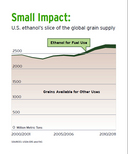Why Tim Searchinger and the Washington Post are Wrong About America's Renewable Fuel - Again
 |
"Thankfully we have something they (our opponents) don't have. On our side, we've got the truth." GENERAL WESLEY CLARK (RET.), GROWTH ENERGY CO-CHAIRMAN
SEE ALSO: Alcohol and Driving Do Mix
WASHINGTON, DC - February 11, 2011: The Growth Energy blog filed this report:
Once again displaying his willingness to ignore science,
peer-reviewed research and the best available data, Tim Searchinger has
authored another intellectually-bankrupt attack on farmers and renewable,
clean-burning biofuels, this time in an op-ed in the Washington Post.
The notion that ethanol is causing the food crisis blithely ignores
market realities, global trade agreements, the domestic farm policies of
sovereign nations, and the impact of Wall Street’s rampant
speculation.
 |
Searchinger’s op-ed and the Washington Post also ignore the fact that a body no less than the U.S. Energy Department’s Oak Ridge National Laboratory found that Searchinger’s ‘indirect land use change’ scheme simply doesn’t exist. That October report found corn ethanol contributed “minimal to zero” impact from ‘indirect land use change.’ You can read that report here
And this 2009 peer-reviewed study by the University of Nebraska found enough questions about ILUC – how it would be measured, whether it exists, why regulations seeking to apply ILUC against biofuels failed to apply ILUC penalties against fossil fuels for the massive military commitment needed to protect access to oil. You can read that report here.
Finally, by blaming biofuels for the food crisis, it is clear that Searchinger and the editors at the Washington Post never read this well-reported story published by Harper’s Magazine, which found unchecked Wall Street speculators caused the last commodities bubble in 2008:
See complete Harper's Magazine article HERE
There is only one commercially-viable alternative to this country’s dependence on foreign oil, and that is domestic ethanol. Every day, foreign oil is getting riskier, costlier and dirtier to extract. On the other hand, with cutting edge technology and innovation, domestic ethanol is getting cleaner, smarter and more abundant.


